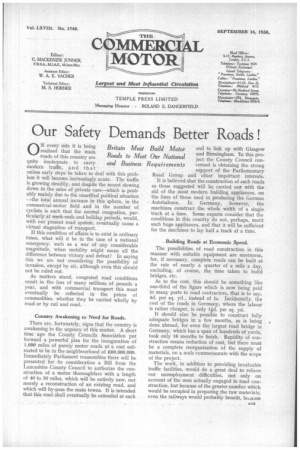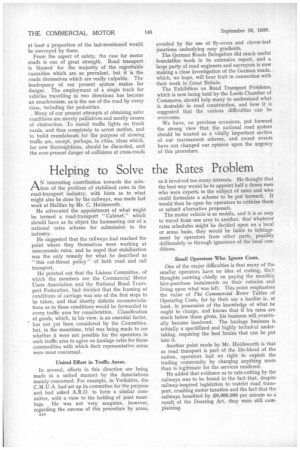Our Safety Demands Better Roads !
Page 25

Page 26

If you've noticed an error in this article please click here to report it so we can fix it.
ON every side it is being realized that the main roads of this country are quite inadequate to carry modern traffic, and th at unless early steps be taken to deal with this problem it will become increasingly acute. The traffic is growing steadily, and despite the recent slowing down in the sales of private cars—which is probably mainly due to the unsettled political situation —the total annual increase in this sphere, in the commercial-motor field and in the number of cyclists is such that the normal congestion, particularly at week-ends and holiday periods, would, with our present road system, eventually cause a virtual stagnation of transport.
If this condition of affairs is to exist in ordinary times, what will it be in the case of a national emergency, such as a war of any considerable magnitude, when mobility might mean all the difference between victory and defeat? In saying this we are not considering the possibility of invasion, except by air, although even this should not be ruled out.
As matters stand, congested road conditions result in the loss of many millions of pounds a year, and with commercial transport this must eventually be reflected in the prices of commodities, whether they be carried wholly by road or by rail and road.
Country Awakening to Need for Roads.
There are, fortunately, signs that the country is awakening to the urgency of this matter. A short time ago the County Councils Association put forward a powerful plea for the inauguration of 1,000 miles of purely motor roads at a cost estimated to be in the neighbourhood of £60,000,000. Immediately Parliament reassembles there will be presented for its consideration a Bill from the Lancashire County Council to authorize the construction of a motor thoroughfare with a length of 40 to 50 miles, which will be entirely new, not merely a reconstruction of an existing road, and which will by-pass the main towns. It is intended that this road shall eventually be extended at each end to link up with Glasgow and Birmingham. In this project the County Council concerned is obtaining the strong support of the Parliamentary Road Group and other impdrtant interests.
It is believed that the construction of such roads as those suggested will be carried out with the aid of the most modern building appliances, on the lines of those used in producing the German Autobahnen. In Germany, however, the machines construct the whole width of a single track at a time. Some experts consider that the conditions in this country do not, perhaps, merit such huge appliances, and that it will be sufficient for the machines to lay half a track at a time.
Building Roads at Economic Speed.
The possibilities of road construction in this manner with suitable equipment are enormous, for, if necessary, complete roads can be built at the rate of nearly a quarter of a mile a day, excluding, of course, the time taken to build bridges, etc.
As to the cost, this should be something like one-third of the figure which is now being paid in many parts to road contractors, that is to say, 4d. per sq. yd., instead of Is. Incidentally, the cost of the roads in Germany, where the labour is rather cheaper, is only lid. per sq. yd.
It should also be possible to construct fully adequate bridges in a few months, as is being done abroad, for even the largest road bridge in Germany, which has a span of hundreds of yards, took only 16 months to finish. Rapidity of construction means reduction of cost, but there must be a complete reorganization of the supply of materials, on a scale commensurate with the scope of the project.
The work, in addition to providing invaluable traffic facilities, would do a great deal to relieve our unemployment difficulties, not only on account of the men actually engaged in road construction, but because of the greater number which would be occupied in preparing the raw materials; even the railways would probably benefit, because at least a proportion of the last-mentioned would be conveyed by them.
From the aspect of safety, the case for motor roads is one of great strength. Road transport is blamed for the majority of the regrettable casualties which are so prevalent, but it is the roads themselves which are really culpable. The inadequacy of our present system makes for danger. The employment of a single track for vehicles travelling in two directions has become • an anachronism, as is the use of the road by every class, including the pedestrian.
Many of our present attempts at obtaining safer conditions are merely palliatives and mostly causes of obstruction. To install traffic lights on trunk roads, and thus completely to arrest motion, and to build roundabouts for the purpose of slowing traffic are, except, perhaps, in cities, ideas which, for new thoroughfares, should be discarded, and the ever-present danger of collisions at cross-roads avoided by the use of fly-overs and clover-leaf junctions embodying easy gradients.
The German Roads Delegation did much useful foundation work in its extensive report, and a large party of road engineers and surveyors is now making a close investigation of the German roads, which, we hope, will bear fruit in connection with their work in Great Britain.
The Exhibition on Road Transport Problems, which is now being held by the Leeds Chamber of Commerce, should help many to understand what is desirable in road construction, and how it is suggested that the various difficulties can be overcome.
We have, on previous occasions, put forward the strong view that the national road system should be treated as a vitally important section of our rearmament scheme, and recent events have not changed our opinion upon the urgency of this procedure.




















































































